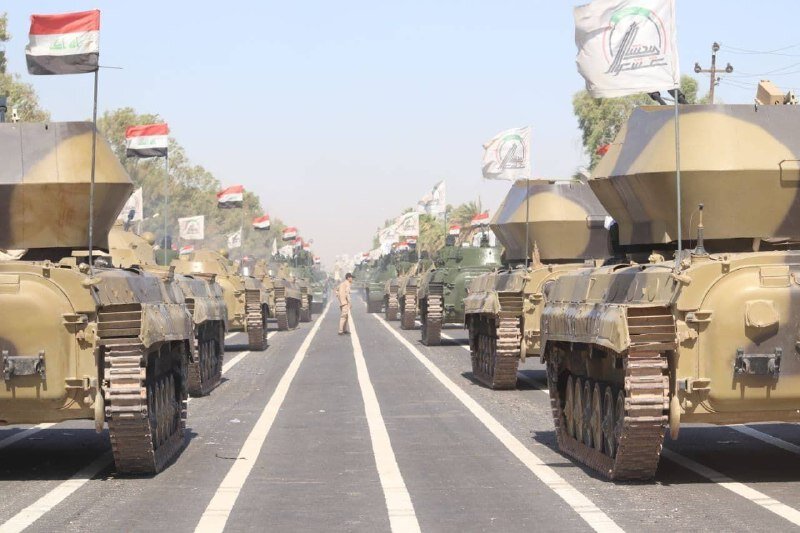Iraq rejects US demand to dismantle popular forces
Iraq rejects US demand to dismantle popular forces
TEHRAN – Iraq has firmly rejected efforts by the United States to dismantle the Hashd al-Shaabi, also known as the Popular Mobilization Units (PMU).

A senior official with the Iraqi Resistance Front has revealed that Ibrahim al-Sumaidaie, an advisor to the Iraqi Prime Minister, was forced to resign after publicly stating that the U.S. had requested the dissolution of all popular armed groups, warning that non-compliance could result in serious consequences for the government.
The pressure has intensified in recent weeks. U.S. Secretary of State Antony Blinken toured the region and made an unexpected visit to Iraq on December 13.
In tandem, foreign parties have joined in the call to disband resistance groups in Iraq.
Notably, the United Nations representative in Iraq met with Grand Ayatollah Ali al-Sistani to urge the dissolution of the PMU.
The influential Shia cleric firmly rejected the request. Following the refusal, Ayatollah Sistani declined a follow-up meeting with the UN representative, who was instead received by his son.
Iraqi religious authorities, including all major clerics, have consistently expressed their support for the PMU.
They emphasize that it is an official body essential for Iraq’s stability. Ayatollah Sheikh Hassan al-Jawahiri, a prominent scholar at the Najaf Seminary, strongly opposed the dissolution efforts, warning that such a move could pave the way for the resurgence of terrorist groups.
The PMU was formed in the summer of 2014, following the collapse of the U.S.-trained Iraqi army when Daesh rapidly seized large parts of northern and western Iraq, including Mosul.
In response to the crisis, Ayatollah al-Sistani issued a historic fatwa calling on Iraqi citizens to take up arms to defend the nation.
This led to the establishment of the PMU, which played a pivotal role in defeating Daesh and liberating occupied territories.
The PMU’s importance to Iraq’s security was demonstrated during the fight against Daesh, where it filled the critical gaps left by the Iraqi military.
PMU forces were instrumental in key battles to liberate major cities, protect vulnerable populations, and dismantle the territorial ambitions of the extremist group. Without their intervention, Iraq’s stability and sovereignty would have been severely compromised.
The PMU continues to enjoy overwhelming support and love from the Iraqi public, who view the force as a symbol of sacrifice and resilience.
Many Iraqis credit the PMU with saving their families and communities during the dark days of Daesh occupation, and they regard its members as national heroes.
Public demonstrations, gatherings, and cultural events frequently celebrate the PMU’s contributions, reflecting a deep bond between the government forces and the Iraqi people.
This public support has bolstered the PMU’s legitimacy and ensured its role remains central in the nation’s defense.
In 2016, the Iraqi Parliament passed a law officially integrating the PMU into the National Armed Forces, granting it legitimacy as part of Iraq’s defense system.
The law solidified the PMU's role in protecting Iraq’s sovereignty and ensuring its territorial integrity, making its dissolution a highly controversial and sensitive issue.
As an official part of the armed forces, the PMU operates under the direct authority of the Iraqi Commander-in-Chief, Prime Minister Mohammed Shia al-Sudani.
Soldiers also receive orders, salaries, pensions, and other benefits from the Iraqi government.
The PMU, established to combat Daesh, continues to be a symbol of Iraqi resistance.
Popular political parties have announced upcoming gatherings in support of the PMU and the Resistance Front in a number of provinces including Najaf, Karbala, and the capital Baghdad.
Despite mounting pressure from the U.S., Iraq’s government has refused to dismantle the PMU. Officials have reiterated that the organization plays a critical role in safeguarding Iraq’s territorial integrity.
The PMU remains active today in its mission to secure Iraq, with forces continuing to fight Daesh sleeper cells and protect the country’s borders, particularly along the frontier with Syria.
The group plays a crucial role in preventing the resurgence of any terrorist activity and in ensuring the ongoing security of the nation, underscoring its ongoing relevance to Iraq’s defense strategy.
As tensions persist, it remains clear that the future of the PMU will continue to be a contentious issue in Iraqi-U.S. relations. However, it appears impossible that this powerful force will be going anywhere.
source: tehrantimes.com